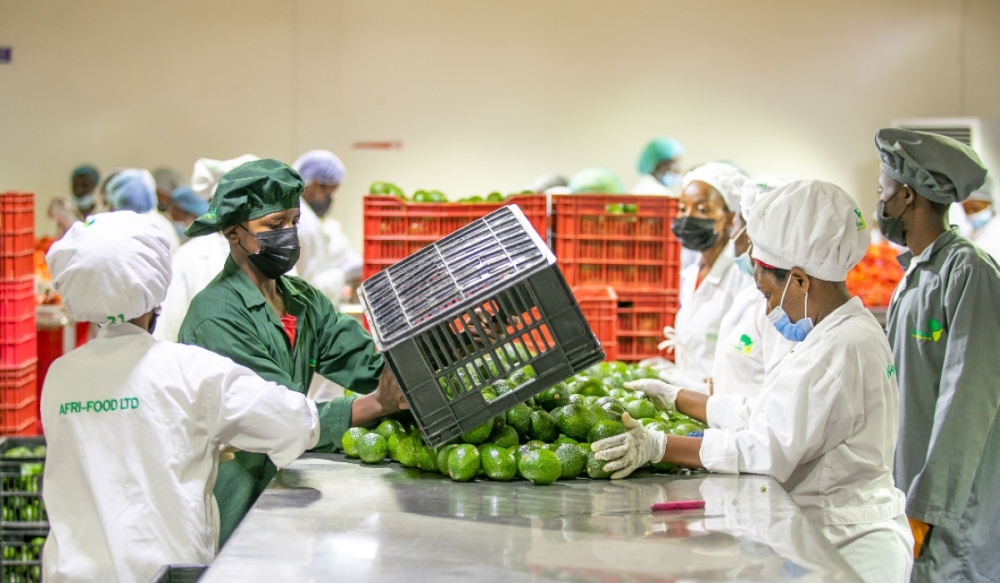

Avocado exporters are upbeat about the prospects of increased capacity and improved quality of avocado exports to the European market, following the first reefer container trial shipment of avocado to Rotterdam, on Wednesday, October 25.
Facilitated by the National Agricultural Export Development Board (NAEB) in collaboration with IDH project, the trial shipment seeks to find an alternative and cost-effective means of transporting horticultural exports to the international markets, as airfreight has proven to be more expensive have more carbon footprint.
ALSO READ: IDH facilitates Rwanda to export avocado by sea freight
Stichting IDH, is an organization (business Foundation) that works with businesses, financiers, governments, and civil society to realize sustainable trade in global value chains and facilitates private sector access to international markets.
The second trial shipment saw 22.4 tonnes of Hass avocado shipped to the Netherlands, which is also the largest importer of avocados in Europe.
The shipment, if successful, exporters said, will be a window of opportunity for Rwanda to expand its markets to other EU countries.


Oluwaseun Rasheed, the CEO of SOUK Farms, who also owns one of the largest private avocado farms in the country hailed the development, pointing out that until now, exporters relied solely on airfreight, which limited their capacity.
"Sea freight not only expands our reach but also significantly reduces logistics costs, enabling better farmgate prices for our smallholder farmers, the backbone of our success increasing by over 20% on average.”
Rasheed added; "Embracing sea freight is a giant leap towards sustainability. It aligns with our commitment to environmental responsibility. This project creates a groundbreaking path to a greener, more prosperous future for exporters of avocado from Rwanda, smallholder farmers in Rwanda. It contributes to the national agenda of increased exports of horticulture crops from Rwanda”.
The development comes at a time when Rwanda is banking on increased horticulture to boost its agriculture export base, hoping to generate $1 billion in annual foreign agricultural revenues by 2024.
In the previous fiscal year, Rwanda exported over 3.2 million kilograms of avocado, with the expectations of reaching 16 million kilograms per year by 2026.
For Emmanuel Harelimana, CEO of Garden Fresh, sea freight offers several advantages over air freight.
ALSO READ: Inside Rwanda&039;s plan to make avocado a major export crop
"Once the trial is successful, exporters will be provided with greater capacity and flexibility. Sea routes are more cost-effective, and also have a lower carbon footprint.”
"The aspect of logistics management should also be looked at for this initiative to be sustainable,” Harelimana who exports 6-8 tons per week, told The New Times.
"As an exporter, we want to see a company like Maersk taking over the logistics from Kigali to Mombasa,” he added.
The initiative is part of the "Investing in Horticultural Development in Rwanda" project, commonly known as HortInvest, funded by the Embassy of the Kingdom of the Netherlands in Rwanda.
"This represents a significant milestone. If this second trial shipment is successful, it will reduce carbon emissions and shipping costs to the European markets, it will open doors to numerous global buyers for Rwanda's horticulture produce,” said Sylvie Nirere, Country Manager at IDH - Rwanda.
She added; "Beyond the economic considerations, the choice to explore maritime routes is well-founded. The rising costs of airfreight, coupled with fragile and unreliable supply chains, have necessitated a shift toward more sustainable and cost-effective transportation systems.”
Nirere also highlighted that it is a realization that the higher environmental carbon footprint associated with airfreight is not tenable in an evolving market focused on sustainability and low carbon emission. Sea freight emerges as a critical component in bringing this vision to fruition.
In her remarks, shortly before flagging off the shipment, H.E. Joan Wiegman, the Ambassador of the Kingdom of Netherlands to Rwanda said; "The initiation of the second trial shipment marks a significant turning point in the history of horticultural exports from Rwanda to the European market.”
"This aligns with the Netherlands' policy to promote Sustainable Trade and Investment with Rwanda and signifies the start of a long-term journey that will require cooperation between the public and private sectors.”
"Going forward, we are committed to promoting mutually economically beneficial initiatives for Rwanda and such catalytic projects unlock markets.”
The second wave of avocados was sourced from over 1,200 smallholder farmers from all corners of the country.
Tapping into the global market
Going forward, Jean-Marie Vianney Munyaneza, the Export Services Division Manager at the National Agricultural Export Development Board (NAEB), expressed the desire for the private sector to take the lead in adopting sea freight for horticultural produce.
While NAEB leads the pilot shipment to Dubai, Munyaneza commended private companies for spearheading the second trial shipment.
He said the development is a cause for celebration and a change of tack within the horticulture industry.
For context, he said, figures from NAEB, indicate that Rwanda's avocado export revenues rose from $1.6 million in 2021 to $4.5 million in 2022.
During the same period, avocado production increased from approximately 1,000 tonnes to 2,600 tonnes, a growth of over 160 percent.
Munyaneza projected that annual avocado production would reach 16,000 tons by the end of 2026, highlighting the need for diversified transport options beyond air cargo.


